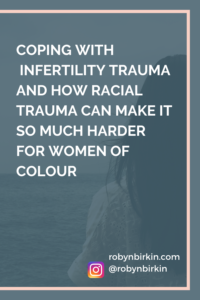
Today on the podcast it’s my absolute pleasure to welcome one of my favourite people on Instagram, Dr Loree Johnson. Loree shares so much wisdom on Instagram as a Psychotherapist whose speciality is in women’s mental and reproductive health. I think that having had her own fertility journey too makes her such an asset to the infertility community and she has such a calm and warm energy about her.
Seriously she is one of my most favourite people.
She is also a person of colour.
2020 has been a huge wake-up call to me if I’m honest. One of my best friends is a person of colour, I experienced racism first hand when I lived in Japan, both my Fertility Specialist and OBGYN were people of colour and I have had the pleasure of getting to work with some of the most incredible young Aboriginal and Torres Strait Islander people. I live in Australia. I don’t post about US holidays, or insurance or any of those things because I live halfway across the country. When George Floyd passed away and the world actually stopped to pay attention to what was happening, I couldn’t help but be forced to re-examine myself, as messy and uncomfortable as it is.
The truth is that I have not been doing enough, especially with the platform I have.
And there have been five major lessons for me
- The SAME issues are experienced here in Australia. Indigenous Australians are 7 times more likely to die in custody than Caucasians.
- Just because you aren’t actively racist, doesn’t mean you’re helping. I had never even considered how vanilla my podcast was – and not because I had actively tried to make it that way, but just because it is what I know. That needs to change. And I need to visibly ensure that people with different stories to mine are also heard. Because I know that many of my listeners are also people of colour, same-sex couples and solo fertility warriors too.
- Reproductive medicine has quite an awful history, and together with modern day discrimination and poverty, there is a great disparity in the statistics and care provided to women of colour
- Trauma is complex. And so many women of colour experience multiple layers – infertility trauma with racial trauma
- This is not over because the riots stop. It requires
Some of the facts:
- Women of colour have higher rates of infertility, yet some of the lowest treatment rates
- Even in mandated states in the United States, they make up significantly lower proportions of IVF cycles
- Women of colour have lower live birth rates (even after IVF), higher miscarriage rates, higher rates of preterm birth, maternal death and fetal death
Click here to read more about these facts.
It is SO hard when you visit a Doctor and don’t feel like you are in a safe place, or that you are receiving the care you are so entitled to.
It is heartbreaking when financial circumstances dictate whether or not you have the ability to create a family
And of course, this touches many fertility warriors, regardless of race. But the fact of the matter is, it affects women of colour in the United States (and likely across the world) more frequently.
And we need to talk about it.
Loree sees this intersection of infertility trauma and racial trauma regularly and is also a member of the American Society for Reproductive Medicine. Loree also serves on its Mental Health Professional’s Anti-Racism Task Force.
I’m so grateful that I was able to welcome Loree onto my podcast for a really honest discussion (even when I was super clumsy and probably said the wrong thing 5648 times).
I want to also say that although this discussion needed to happen, and I’m just being super honest, it is not the role of black women to educate us. I feel like there would be a lot of podcasts that invite a person of colour on to talk about these issues and then never discuss it again.
This is not this kind of scenario.
And I also want to mention that professionals such as Loree are just that. Professionals. One of the core ways in which we help bring more equality is by actively ensuring that we look outside our own race and consider people for their expertise and support them professionally. But not just because they’re people of colour – because they’ve done the work and they’re good at their job.
So, without further adieu, please welcome Dr Loree Johnson to the Fertility Warriors Podcast where we have an open and honest discussion about the intersection of infertility trauma and racial trauma.
About Dr Johnson:
Dr. Loree Johnson is a Licensed Marriage and Family Therapist (LMFT) and Coach in private practice with more than 25 years of experience as a clinician, educator, and clinical supervisor.
Specializing in women’s mental health and reproductive health, Dr. Loree helps her clients overcome the emotional challenges that come with infertility – including pregnancy loss and emotional trauma. She also helps couples, who have become divided by their fertility journey, strengthen their connection.
Dr. Loree is a clinical fellow of the American Association for Marriage and Family Therapy and has served on both its state and national boards. She is also a member of the American Society for Reproductive Medicine and serves on its Mental Health Professional’s Anti-Racism Task Force.
She lives in Hermosa Beach, CA with my husband and toy poodle, Amoré. In her spare time, she enjoys salsa dancing, travelling, reading, and riding her motorcycle.
To download a copy of Dr Loree’s Fertility Self Care Plan, head here: Fertility Self-Care Plan
Listen here.
